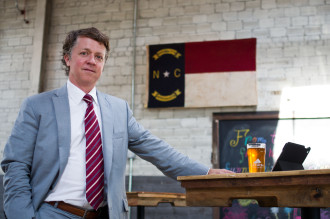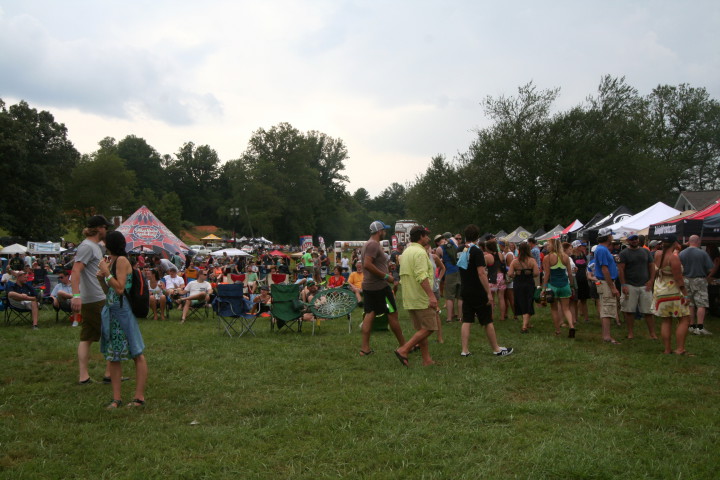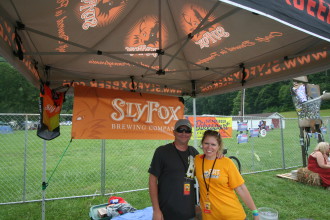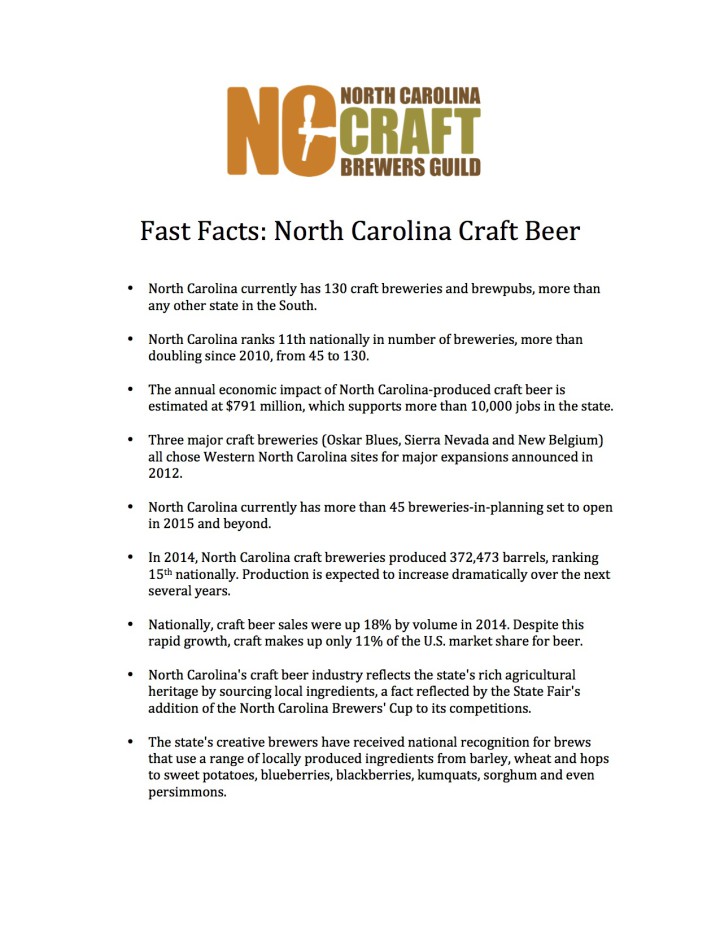UPDATE (8/19): Alcohol Law Enforcement (ALE) Special Agent in Charge of the Western District Stacy Cox has issued a statement in response to MountainTrue’s announcement yesterday regarding the cancellation of Mountain Brew Fest:
“I was blindsided yesterday with the Mountain Brew Festival [announcement],” says Cox. “I had answered some questions for their coordinator last month and that was the last I had heard from them. ALE did nothing aside from offer advice and send them to NCABCC for further assistance.”
UPDATE (8/18): Earlier Tuesday morning, the local nonprofit organization MountainTrue announced it has cancelled its upcoming Mountain Brew Fest, scheduled for this Saturday (Aug. 22) in Hendersonville, due to an inability to secure the proper permits for participating breweries from the Alcohol Beverage Control and Alcohol Law Enforcement agencies. For more information about MountainTrue’s decision to cancel and official statements from the nonprofit, see Xpress’s preview of Mountain Brew Fest here and their official cancellation announcement here.
North Carolina has always had a complicated relationship with alcohol. The Tar Heel State was one of the first to enact Prohibition in 1909 and one of the last states to repeal it. However, alcohol has consistently been an economic driver in North Carolina, as it still is, with 130 craft breweries as of 2014 – the most of any Southern state. Craft breweries often use local products, benefiting agricultural businesses and bringing in tourists from across the country for a variety of festivals throughout the year.
What’s often lost amid the discussion is the evolving landscape and culture of the brewing industry and how it relates to state alcohol provisions. Many of the laws regulating the industry are complex, according to members of the craft brewing community, and as the craft brewing industry in the region grows into a multimillion-dollar business, the desire to review the statutes and improve communication with state officials has come to the forefront.
To that end, state regulatory officials say they are working in cooperation with the local brewing industry to facilitate a responsible relationship that aids the future expansion of craft brewing in the mountains.
Business a-brewin’
The origins of craft beer in the mountains can be traced to the basement of Barley’s Taproom and Pizzeria in downtown Asheville. It was there that Oscar Wong and John McDermott founded Highland Brewing Co. in 1994, which they say was the first craft brewery in the region since the end of Prohibition.
Since that time, Western North Carolina has seen a veritable explosion in the craft brewing industry. “We were playing catch-up for a while,” says Erik Myers, head brewer at Mystery Brewing Co. in Hillsborough, North Carolina, and president of the North Carolina Craft Brewers Guild. He notes that North Carolina now has one of the fastest rates of new brewery openings in the country.
WNC’s craft brewing industry has since ballooned to more than 20 independent brewers of all sizes and specialties, facilitated by the “Pop the Cap” law, which in 2005 raised the maximum alcohol-by-volume allowed in beer from 6 percent to 15 percent, and Asheville’s revitalization as a tourist mecca.
“We bring thousands of people to [Black Mountain],” says Dave Quinn, co-founder of Pisgah Brewing Co. “When we have a sold-out show, we increase the population of Black Mountain by 20 percent. Every hotel in Black Mountain is sold out, all the places to eat are full.”
Quinn adds that a significant amount of their concert attendees come from outside Buncombe County, and about 5 percent travel from out of state.
The success of Highland, Pisgah and others has led to Asheville being dubbed “Beer City, USA” from 2009-12 by Charlie Papazian’s popular national poll and caught the attention of nationally known brewers like Sierra Nevada, Oskar Blues and New Belgium, which have all built East Coast facilities in the region.
In 2014 alone, the North Carolina craft brewing industry produced 372,473 barrels of beer and brought about $800 million into the state, according to statistics provided by the N.C. Brewers Guild. And more than 45 additional breweries across the state are expected to open in the next several years.
Law and order
However, with increased exposure and revenue comes increased regulatory attention, as has been demonstrated over the past few months.
“The number of brewers in North Carolina has grown at an incredibly rapid pace over the last several years,” says Stacy Cox, special agent in charge of the Western District of N.C. Alcohol Law Enforcement. Along with seven other ALE agents, Cox oversees more than 1,100 outlets spanning 16 counties in the Western North Carolina. She says that the recent ALE activity can be attributed to the “numerous laws and rules that need to be adhered to,” which often “takes time to learn and understand.”
“I think a lot of brewers get into the business of making beer because they love beer and they want to share their recipes with the public,” says Hayley Wells, whose law firm represents brewing interests across the country. “Then all of the sudden, they’re running a manufacturing business and they may not learn all of those rules before they open the door.”
One recent instance of this misunderstanding of the rules came in May during Asheville’s Beer City Festival, where ALE agents cited several brewers for violations, including allegations of brewery employees drinking while serving at the event (a prohibition the Cox says ensures workers can determine the age and sobriety of customers) and servers exceeding the sample size limits allowed under state law, which stands at 2 ounces per free sample.
The Race to the Taps series, hosted by several local breweries and businesses over the course of the spring and summer, also ran into legal complications surrounding cooperative advertising regulations. North Carolina civil statutes set parameters for “sponsorships of festivals, concerts, fundraisers or special events” involving brewers, nonalcohol-related businesses and retailers.
“Essentially, when a retailer and a brewery sponsor an event, the brewery must get approval for the promotion of the event from the North Carolina ABC Commission,” says Attorney Derek Allen, who represents a host of brewing interests across the country. “Race to the Taps had retail sponsors and brewery sponsors, [and] until industry approval was obtained, promotion of the event ran afoul of the regulations.”
In the case of Race to the Taps, none of the breweries involved were officially cited, after discussions between brewers and ALE agents clarified marketing discrepancies, a legal area that Allen, who works alongside Wells at the law firm Ward and Smith, calls “not terribly intuitive. One tiny fact-changing can make something go from illegal to legal.”
Allen adds the increased profile of state regulators around the craft brewing industry is simply a byproduct of its success. “The industry has grown to the point where it can no longer be looked at as a rogue, upstart business,” he notes. “You can’t have multimillion-dollar companies producing 600,000 barrels a year and still be the underdog.”

Perhaps the highest-profile case of miscommunication came at Oskar Blues’ Burning Can Festival on the weekend of July 17-18, when several out-of-state and local brewers were informed by ALE agents that they had not received the proper permits to allow them to pour beer at the event.
“I personally learned about the event Wednesday evening [before the festival],” Cox says of the incident, adding that ALE was acting under guidance from the N.C. ABC Commission Legal Division. “We tried to come up with solutions, but with such short notice, we were limited.”
While Oskar Blues has taken full responsibility for the miscommunication, other brewers present at the event have expressed reservations about the way ALE agents approached the issue. Quinn suggests that ALE could have helped expedite permits instead of threatening citations. “It’s not like [the state] was missing taxes, because this was all donated product anyway,” Quinn says.
Corey Reid, sales manager for Sly Fox Brewing Co. in Pottstown, Pennsylvania., has a similar impression of ALE’s involvement. “We were told that we would be in violation of North Carolina law giving away free samples and could be fined,” he says, adding that ALE’s message also stated that the citation “would jeopardize our ability to register our beer for sale in North Carolina when we decide we are prepared to open that market.”
This varied from last year’s Burning Can event, says Reid, when “the topic wasn’t ever discussed.” He adds that “creating a financial burden to such a respectable company and limiting the funds that a few nonprofit foundations desperately need made me question the motivation of the ALE.”
Cox asserts there was no malicious intent to harm charities. “Please understand, we did not criminally charge anyone or submit any violation reports to NCABCC in reference to Burning Can,” she states. “If we had learned about it sooner, we could have possibly remedied some of the problems ahead of time.”
She explains that the festival was covered by a “Special One Time (SOT) permit” issued to Can’d Aid, a charitable foundation operated by Oskar Blues. In addition to the SOT permit, each brewer was required to obtain a malt beverage special-event permit. Those traveling from out of state also needed a nonresident malt beverage vendor permit.
There are some exceptions. Out-of-state breweries whose products have been approved for sale in North Carolina, but do not have a nonresident malt beverage vendor permit, are allowed on-site at such events on the condition that their products are served by volunteers not on a company’s payroll, according to Cox. The same goes for those who obtained a permit but whose products are not approved for sale in the state.
And where is the line that distinguishes a homebrewer trying out his latest batch from entities that fall under state regulations? ABC’s retail guide states anyone possessing more than 80 liters of a malt beverage (about nine 24-packs and some change) must have a proper ABC permit (the rules are slightly different for beer contained in kegs). In regard to samples given out at festival events, vendors must obtain a special-event permit from their local ABC board in order to provide free tastings, according to the ABC retail guide.

Allen explains that the specific issues involved with Burning Can are indicative of a broader misunderstanding of what the law requires at festival-type events, especially when there are multiple breweries with different levels of legal standing involved.
“There’s definitely a disconnect between the ABC’s interpretation of the regulations, how the ALE may enforce it, how the industry may interpret it,” he says, noting that many of the recently enforced statutes “have been on the books forever” even if they come across as new. “It’s really just the enforcement of something that’s been there for a long time.”
Others involved in the industry are more ambivalent. Most breweries contacted for this article chose not to comment publicly on the recent enforcement actions, a reluctance that Pisgah’s Quinn attributes to a “culture where people want to try and keep their heads down, and if you don’t get noticed, you won’t get in trouble.”
He says that Pisgah is in compliance with the laws, has a good relationship with local police and has had many pleasant interactions with ALE officers in the past, but several recent run-ins with new agents have left a bad taste in his mouth.
“They show up in the middle of some of our events, [during] commerce hours, throwing around their weight and citations, and spooking the customers,” he says.“We’re not criminals, and I feel like sometimes we get treated that way.”
In response, Cox says her department was alerted to some safety concerns at a recent show at Pisgah, but no citations or violations were issued. “Wherever alcohol is sold, there are going to be issues from time to time,” she notes. “Pisgah is a good business and brings a lot of money and tourism into the area.”
Cox adds that “[her department] doesn’t want this to become an ‘us versus them’ situation” and that her office is working to build “good relationships with the brewing industry” while “ensuring the safety of the public.”
Working together
In an effort to address confusion over the law, state officials sat down with the Asheville Brewers Alliance and head brewers in July for an unprecedented meeting.
“That is the first time I’ve ever heard of in this state where you have the ABC, ALE and the local industry members all sit down in the same room and talk about it,” says Allen, who attended the meeting.
Cox is optimistic about the results of the meeting. “It was an open question-and-answer forum and was quite productive,” she said, adding that both the ALE and ABC Commission offer free training on North Carolina rules and regulations for new breweries and “will help any permitted business to achieve compliance.”
Despite the initial complications at Burning Can, the outcome of the altercation – turning the festival into a “private party,” which legally satisfied state regulations and allowed the event to proceed at no expense to the attendee – suggest that communication can lead to clarity among the various groups involved.

Allen makes sure to credit the state ABC Commission and ALE for working with brewers to resolve the issues. “They were available at 8:30 in the morning on Saturday at the highest levels, and they worked with us to come up with something that made some sense for everyone.”
A similar event held on the same weekend as Burning Can, meanwhile, displayed the potential of the brewing industry and state officials to learn from past incidents. Wicked Weed’s Funk Asheville Beer Festival featured some of the same out-of-state breweries that were on hand at the Oskar Blues event.
Despite initial suspicions of favorable treatment, Cox says that Wicked Weed and its legal representation made sure that each brewer in attendance was in compliance with the law. Wells confirms this, saying that Wicked Weed obtained the proper permits before the event.
Allen adds, “The ALE and the ABC have both made it clear to us that their piece is not so much doing the ‘gotcha’ thing’ than it is educating this industry so people get it right.”
New rules for new realities
Among the issues to emerge from the meeting between regulators and brewers was how laws may change moving forward as craft brewing continues to become an economic focal point in the region.
In an effort to update the regulations to reflect the changes in this industry, the NCABCC is launching a review of the current North Carolina statutes governing everything from alcohol content of particular beers to the amount of beer served in a flight, marketing collaborations, permitting for beer coming from other states, quality assurances, and the way breweries and state officials communicate and interact.
Agnes Stevens, spokesperson for the state ABC Commission, says the ABC statutes are regularly reviewed and updated. Cox agrees, adding that the commission solicits the brewing industry’s input on revisions and works on updating the laws with tourism and the craft beer industry specifically in mind.
But with hundreds of pages of legalese to peruse and discuss, providing a sensible and comprehensive revision of alcohol regulations will take time.
N.C. Craft Brewers Guild President Myers declines to comment specifically on the laws the guild is working to update and change but says that it is interested in “modernization” and would like to see future laws reflect existing industry, rather than “the industry of 30 to 100 years ago.”
Can’t we all just get along?
In the meantime, the hope is that continued open communication between the industry and state regulatory bodies will go a long way toward reducing future legal problems.
“Breweries don’t make their money or their living on the corners in the seedy part of town,” says Allen. “They want to do the right thing, [and] getting consistency in application is very important to them. That’s where we’re headed.”
“We’re all learning about [the laws],” says Quinn. “And I hope that once they have enough interactions with us, where we’re friendly and open, they’ll back off.”
Cox says she is pleased with how her department’s relationship with brewers has evolved over the summer. “Communication and collaboration has increased, and our relationships are growing every day,” she notes, adding that the amount of inquiries her office receives has tripled since March. “I look forward to continuing the cultivation of our relationships.”
And any trepidations felt by brewers currently will not make much of an impact on the future growth of the industry, according to pretty much everyone spoken to. “We’re still growing in leaps and bounds, and I don’t see us slowing down anytime soon,” says Myers. “The North Carolina Craft Brewers Guild, the Asheville Brewers Alliance and many others will be heavily involved in the public review process to make sure that we all have responsible and sensible laws for this incredible and growing industry in the state, so that we’re all successful, responsible and prosperous.”







Before you comment
The comments section is here to provide a platform for civil dialogue on the issues we face together as a local community. Xpress is committed to offering this platform for all voices, but when the tone of the discussion gets nasty or strays off topic, we believe many people choose not to participate. Xpress editors are determined to moderate comments to ensure a constructive interchange is maintained. All comments judged not to be in keeping with the spirit of civil discourse will be removed and repeat violators will be banned. See here for our terms of service. Thank you for being part of this effort to promote respectful discussion.